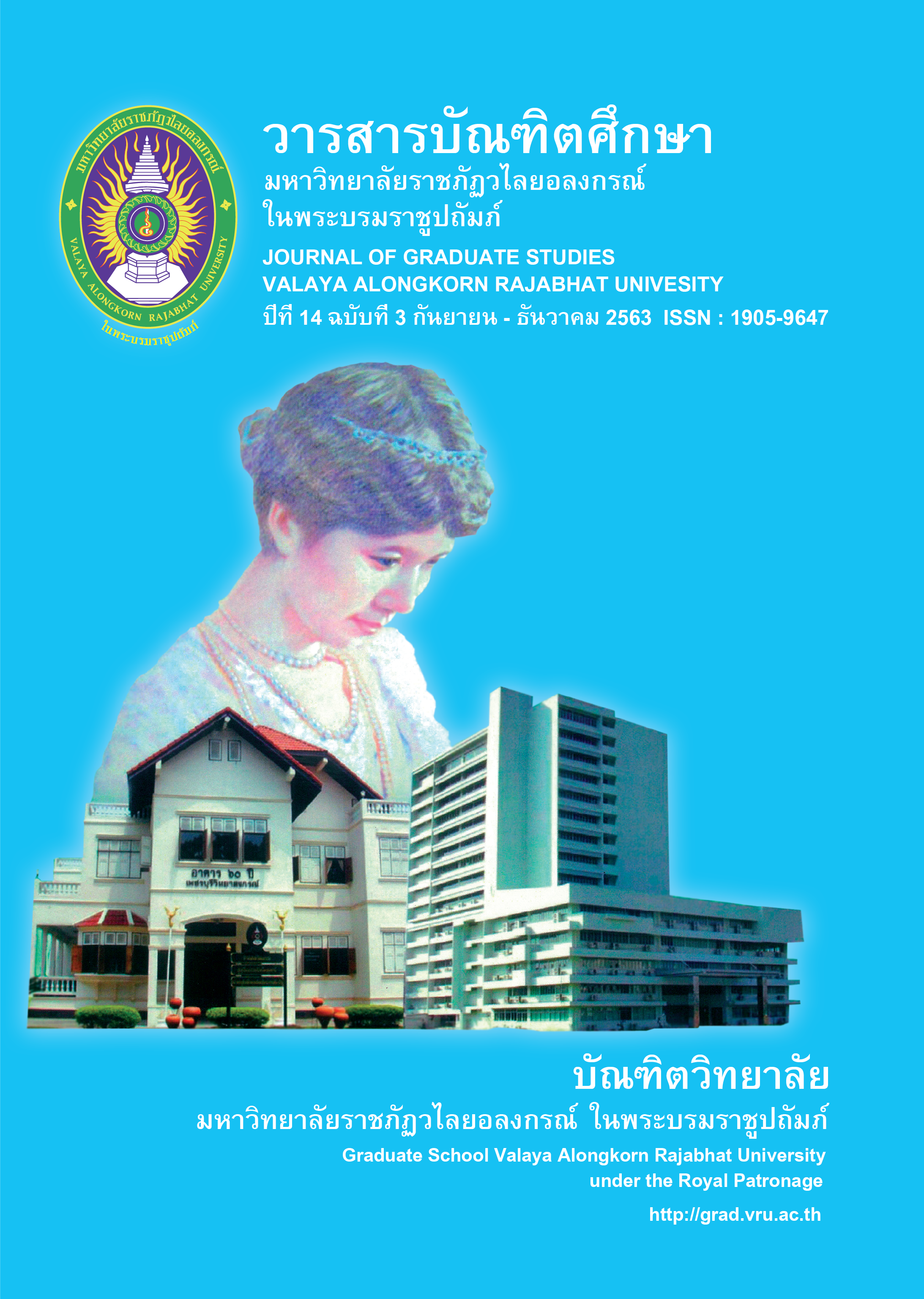DEVELOPING COMPETENCIES OF GRADUATES THROUGH WORK-BASED EDUCATION
Main Article Content
Abstract
The study of developing proficiencies of graduates through work-based education purposes 1) to study the satisfaction of entrepreneurs toward graduates with English language programs, 2) to investigate the expectations of entrepreneurs toward graduates and 3) to propose the guidelines for developing the graduate’s proficiency in the fields of business English through Work-based Education that meets the needs of labor market. The subject are business serviced entrepreneurs who emphasis English language such as modern trades, health and medical services, airline services, hospitality and tourism services. There are 10 experienced and knowledgeable experts in the service sector and 300 business-serviced entrepreneurs. This research uses mixed methods. The quantitative method used the questionnaires and the results were analyzed by using statistic program with mean score and standard deviation. The qualitative method used a focus group discussion in this study and the data was analyzed with content analysis.
The results of the study show that: 1) entrepreneurs need the institutions improve their English-language graduates' competencies such as writing and translation skills, especially focusing on creative writing which has no form or template. 2) the expectation of the entrepreneurs found that the graduates should have more knowledge in English for specific purposes; medical services, selling products, and health and wellness due to the entrepreneur’s expectation emphasises on communicative English for service, selling, and increasing sales. Finally, 3) the guideline of developing competencies of graduates according to labour market, educational institute should develop business English for graduates and the curriculum should emphasis on writing and translation ability. Particularly, Management skills, immediate problem-solving skills are necessary.
Article Details

This work is licensed under a Creative Commons Attribution-NonCommercial-NoDerivatives 4.0 International License.
บทความทุกเรื่องได้รับการตรวจความถูกต้องทางวิชาการโดยผู้ทรงคุณวุฒิ ทรรศนะและข้อคิดเห็นในบทความ Journal of Global of Perspectives in Humanities and Social Sciences (J-GPHSS) มิใช่เป็นทรรศนะและความคิดของผู้จัดทำจึงมิใช่ความรับผิดชอบของบัณฑิตวิทยาลัย มหาวิทยาลัยราชภัฏวไลยอลงกรณ์ ในพระบรมราชูปถัมภ์ กองบรรณาธิการไม่สงวนสิทธิ์การคัดลอก แต่ให้อ้างอิงแหล่งที่มา
References
Bank of Thailand. (2014). praden sētthakit nai rō̜p pī 2557 [Economics Issue]. Retrieved from https://www.bot.or.th/Pages/PageNotFoundError.aspx?requestUrl=https://www.bot.or.th/Thai/MonetaryPolicy/EconomicConditions/AnnualRepor.
Boud, D. & Solomon, N. (2001). Work-based learning: a new higher education? McGraw-Hill Education (UK).
Brockmann, M., Clarke, L. & Winch, C. (2008). Knowledge, skills, competence: European divergences in vocational education and training (VET)—the English, German and Dutch cases. Oxford review of education, 34(5), 547-567.
Cronbach, L. J. (1951). Coefficient alpha and the internal structure of tests. Psychometrika. 16(3), 297-334.
Evers, F. T., Rush, J. C. & Berdrow, I. (1998). The Bases of Competence. Skills for Lifelong Learning and Employability: ERIC.
Flege, J. E., McCutcheon, M. J. & Smith, S. C. (1987). The development of skill in producing word final English stops. The journal of the acoustical society of America. 82(2), 433-447.
Hariharasudan, A. & Kot, S. (2018). A Scoping Review on Digital English and Education 4.0 for Industry 4.0. Social Sciences. 7(11), 227.
Jones, C. & Pimdee, P. (2017). Innovative ideas: Thailand 4.0 and the fourth industrial revolution. Asian International Journal of Social Sciences. 17(1), 4-35.
Kirkpatrick, R. (2012). English education in Thailand: 2012. Asian EFL Journal. 61, 24-40.
Kirschenbaum, M. (2012). What is digital humanities and what’s it doing in English departments. Debates in the digital humanities. 3.
Lertwannawit, Aurathai, and Nak Gulid. (2019). International tourists service quality perception and behavioral loyalty toward medical tourism in bangkok metropolitan area. Journal of Applied Business Research (JABR). 27.6 (2011), 1-12.
Luke, A. (2018). Genres of power: Literacy education and the production of capital. In Critical Literacy, Schooling, and Social Justice (pp. 161-185): Routledge.
Marginson, S. (2006). Dynamics of national and global competition in higher education. Higher Education. 52(1), 1-39.
McLean, P. & Ransom, L. (2007). Building intercultural competencies: Implications for academic skills development. In teaching international students (pp. 57-74). Routledge.
National Institute of Educational Testing Service. (2014). khūan phatthanā ʻarai nai yuk prathēt Thai 4.0 [What should we develop in Thailand in the age of 4.0?]. Nursing Journal of the Ministry of Public Health. 1(2), 3-9.
Panyawong-Ngam, L., Tangthong, N., & Anunvrapong, P. (2015). A model to develop the English proficiency of engineering students at Rajamangala University of Technology Krungthep, Bangkok, Thailand. Procedia-Social and Behavioral Sciences. 192, 77-82.
Pennycook, A. (2017). The cultural politics of English as an international language: Routledge.
Poolsawad, K., Kanjanawasee, S. & Wudthayagorn, J. (2015). Development of an English communicative competence diagnostic approach. Procedia-Social and Behavioral Sciences. 191, 759-763.
Prapphal, K. (2003). English proficiency of Thai learners and directions of English teaching and learning in Thailand. Journal of Studies in the English Language. 1.
Prapphal, K. (2008). Issues and trends in language testing and assessment in Thailand. Language Testing. 25(1), 127-143.
Puncreobutr, V. (2017). The policy drive of Thailand 4.0. St. Theresa Journal of Humanities and Social Sciences, 3(1), 91-102.
Riemer, M. J. (2002). English and communication skills for the global engineer. Global J. of Engng. Educ. 6(1), 91-100.
Runci, S. J., O'Connor, D. W. & Redman, J. R. (2005). Language needs and service provision for older persons from culturally and linguistically diverse backgrounds in southeast Melbourne residential care facilities. Australasian Journal on Ageing. 24(3), 157-161.
Sermsook, K., Liamnimit, J. & Pochakorn, R. (2017). An Analysis of Errors in Written English Sentences: A Case Study of Thai EFL Students. English Language Teaching. 10(3), 101-110.
Smith, L. E. (2015). English as an international language: No room for linguistic chauvinism. Journal of English as a Lingua Franca. 4(1), 165.
Srisa-arn. (2018). kān rīan kānsō̜n læ kānchai phāsā ʻAngkrit nai yuk 4.0 [Learning and Teaching English language in the age of 4.0]. Retrieved from https://www.wu.ac.th/th/news/14259.
Thanosawan, P. (2018). Higher Education Research: The Study of Problems and Challenges of the AEC for the Faculty of Education, Srinakahriwirot University. Contract. 20(231/2559).
The Board of Investment of Thailand. (2018). phāp rūam sētthakit [Economic overview]. Retrieved from https://www.boi.go.th/index.php?page=economic_overview.
Yao, Y., & van Ours, J. C. (2015). Language skills and labor market performance of immigrants in the Netherlands. Labour Economics. 34, 76-85.


